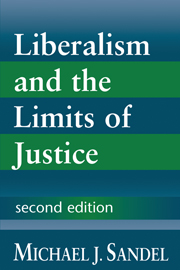Crossref Citations
This Book has been
cited by the following publications. This list is generated based on data provided by Crossref.
Gérard, Philippe
1995.
Droit et démocratie.
p.
299.
Wodon, Quentin
1998.
Humanité, humanitaire.
p.
79.
Merle, Jean-Christophe
1998.
Questions au libéralisme.
p.
87.
Clark, Gordon Leslie
1999.
A Community Solidarity: Public Pension Fund Investment in Community Development.
SSRN Electronic Journal ,
Richardson, Henry S.
1999.
Institutionally Divided Moral Responsibility.
Social Philosophy and Policy,
Vol. 16,
Issue. 2,
p.
218.
Erben, Michael
2000.
Ethics, Education, Narrative Communication and Biography.
Educational Studies,
Vol. 26,
Issue. 3,
p.
379.
Beiner, Ronald
2000.
Community versus citizenship: MacIntyre's revolt against the modern state.
Critical Review,
Vol. 14,
Issue. 4,
p.
459.
Alexander, H. A.
2000.
Conflicting Philosophies of Education in Israel/Palestine.
p.
129.
Cruz-Doña, Rena dela
and
Martina, Alan
2000.
Diverse Groups Agreeing on a System of Justice in Distribution: Evidence from the Philippines.
Journal of Interdisciplinary Economics,
Vol. 11,
Issue. 1,
p.
35.
Talisse, Robert B.
2000.
Two‐faced liberalism: John Gray's pluralist politics and the reinstatement of enlightenment liberalism.
Critical Review,
Vol. 14,
Issue. 4,
p.
441.
Clark, Gordon L.
2000.
Moral sentiments and reciprocal obligations: The case for pension fund investment in community development.
Philosophy & Geography,
Vol. 3,
Issue. 1,
p.
7.
Heathorn, Stephen
2000.
National Identity and Justice.
National Identities,
Vol. 2,
Issue. 3,
p.
221.
Seth, Sanjay
2001.
Liberalism and the politics of (multi)culture: Or, plurality is not difference.
Postcolonial Studies,
Vol. 4,
Issue. 1,
p.
65.
Kessler, Laura T.
2001.
The Attachment Gap: Employment Discrimination Law, Women's Cultural Caregiving, and the Limits of Economic and Liberal Legal Theory.
SSRN Electronic Journal ,
Starrat, Robert J.
2001.
Democratic leadership theory in late modernity: an oxymoron or ironic possibility?.
International Journal of Leadership in Education,
Vol. 4,
Issue. 4,
p.
333.
Klosko, George
2001.
The Natural Basis of Political Obligation.
Social Philosophy and Policy,
Vol. 18,
Issue. 1,
p.
93.
FURMAN, GAIL C.
and
STARRATT, ROBERT J.
2002.
Leadership for Democratic Community in Schools.
Yearbook of the National Society for the Study of Education,
Vol. 101,
Issue. 1,
p.
105.
Ross, Heidi
2002.
The Space between Us: The Relevance of Relational Theories to Comparative and International Education.
Comparative Education Review,
Vol. 46,
Issue. 4,
p.
407.
Etzioni, Amitai
2002.
Are Particularistic Obligations Justified? A Communitarian Examination.
The Review of Politics,
Vol. 64,
Issue. 4,
p.
573.
Furman, Gail C.
and
Starratt, Robert J.
2002.
Leadership for Democratic Community in Schools.
Teachers College Record: The Voice of Scholarship in Education,
Vol. 104,
Issue. 9,
p.
105.



